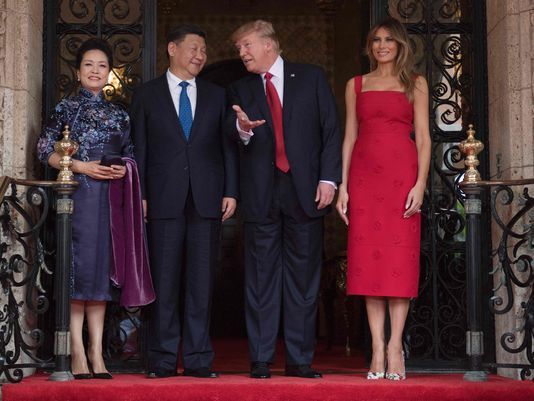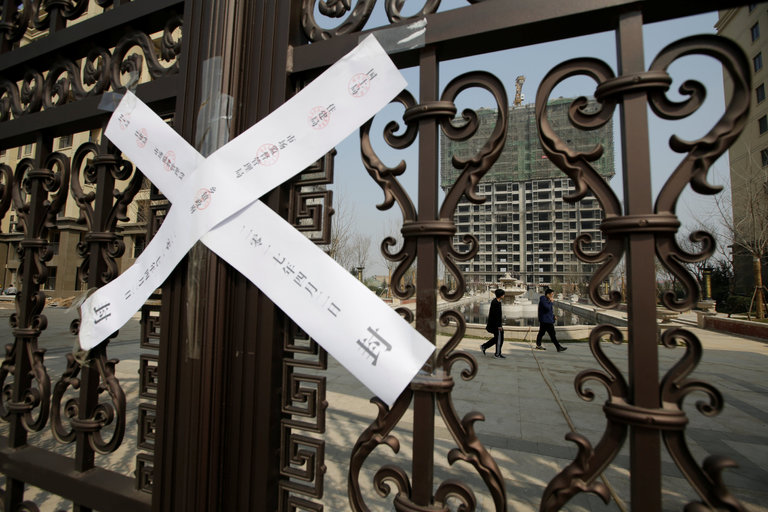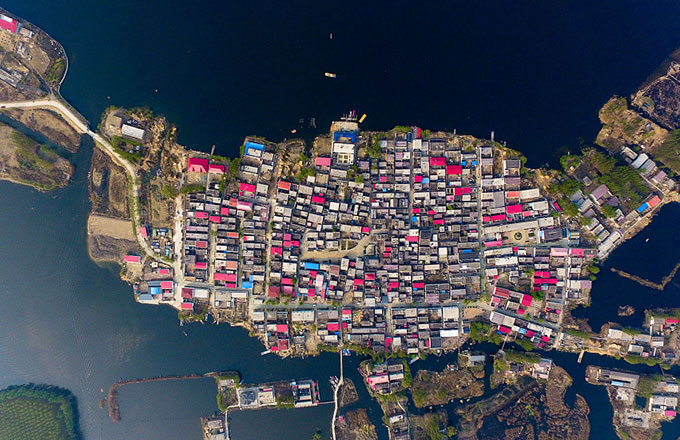
 The Xi-Trump Summit in Florida
The Xi-Trump Summit in FloridaPresident Xi Jinping arrived at Mar-a-Lago on Thursday for a much anticipated summit with President Trump, which most expected to be a show of cordiality as the two develop a working relationship. In one of the few press moments before Thursday's dinner, Trump said he and Xi already had "developed a friendship," but then quipped, "I have gotten nothing, absolutely nothing."
Xinhua News reported that Xi invited Trump to visit China in 2017. While the summit was set to cover North Korea, the $300 billion trade deficit, and U.S. arms sales to Taiwan, Trump's sudden announcement that he had ordered a missile strike on a Syrian airfield largely overshadowed the yet unreleased outcomes of the meeting.
There has been little reporting from Chinese media on what was discussed outside of a Xinhua News report (link in Chinese) which quoted Xi as saying, "There are a thousand reasons to make the China-U.S. relationship work, and no reason to break it." CNBC's Eunice Yoon conjectured that, "discussions about the event appeared to be blocked and censored [in China]." There were, however, Weibo comments on Chinese First Lady Peng Liyuan's outfit, and the handshake between Xi and Trump. SCMP even had a video on how Xi could approach Trump's awkward handshakes. Cheng Li of Brookings argued that their interactions and development of a personal rapport may actually be one of the most important outcomes of the meeting. The world will have to wait and see what AFP described as Xi's "tweetable deliverables," or offerings of trade and jobs for Trump to tweet about.
Prior to the meeting, many Chinese have become more acquainted (link in Chinese) with the role that Jared Kushner, Trump's son-in-law, has played in facilitating the summit between the two leaders. Politico reported that Henry Kissinger advised Kushner. Compared to the more experienced members on the China side, the U.S. has an unlikely China hand in Matt Pottinger, a former WSJ reporter in China, and Marine.
 A New City, Three Times the Size of NYC, is on Beijing's Horizon
A New City, Three Times the Size of NYC, is on Beijing's HorizonChina announced the plans for the Xiongan New Area, a new city to be built 60 miles southwest of Beijing, which will eventually grow nearly three times the size of New York. It represents an ambitious effort to usher in a new growth model of economic inclusiveness and environmental sustainability, or as Xinhua News reported, to "not repeat the outdated practice of 'pollution first, treatment later.'"
Through the creation of a new city, the central government aims to relocate public institutions and businesses playing non-capital roles outside of central Beijing. It is also considered to be a centerpiece of the government's grand strategy to jointly develop Beijing, Hebei, and Tianjin into a unified economic zone that would rival the Zhujiang River Delta and the Yangtze River Delta. China Daily has put together a Q&A on the Xiongan New Area.
President Xi Jinping is said to have handpicked the site of the new district, which is composed of three rural counties in Hebei. As the news spread, property speculators swarmed, setting off a flurry of property purchases. Asking prices of real properties have jumped as high as 10 fold (link in Chinese) in some cases, prompting a government freeze on illegal transactions. It also has fueled guesswork on which state corporate headquarters will be moving to the new district (link in Chinese).
 China's New Anti-Graft Drama
China's New Anti-Graft DramaA new Chinese thriller, "In the Name of the People," is generating a lot of excitement in China after debuting March 28th on Hunan Television. According to one report (link in Chinese), its first episode has already been viewed 350 million times. It is an anti-graft drama aesthetically compared to "House of Cards," and is said to be inspired by real-life cases involving high-ranking officials. The show's preview (link in Chinese) is action packed and flush with patriotism. It also cost $17.42 million to produce, and is funded by the Supreme People's Procuratorate, the state agency tasked with investigating corruption cases. It is reported that there will be four more television series on the theme of graft coming out in the future, signaling a reversal in government restrictions on corruption-themed TV dramas following a moratorium (link in Chinese) in 2004 dictating that such shows can not be aired during prime time.
 China Quiz
China QuizAfter Beijing's announcement to move central government offices to the Xiongan New Area, one might wonder what exactly a New Area is. In China, new urban districts, or New Areas are given special economic and development supported by the central or regional government. Which of the following are not special privileges granted to New Areas?
- Special tax incentives for foreign investment
- Allowances for wholly foreign-owned enterprises to set up operations
- Complete autonomy from central government rules and regulations
Prepared by China-US Focus editorial teams in Hong Kong and New York, this weekly newsletter offers you snap shots of latest trends and developments emerging from China every week, while adding a dose of historical perspective.
- 2017-03-31 Google Makes a Comeback to China?
- 2017-03-24 Xi and Tillerson Trade Phrases
- 2017-03-17 Sec. Tillerson Visits Asia ahead of Xi-Trump Summit
- 2017-03-10 Defending China's Defense Budget
- 2017-03-03 The Korean Peninsula Draws Headlines
- 2017-02-22 CPC Meets to Reaffirm Commitments in Anticipation of "Two Sessions"
